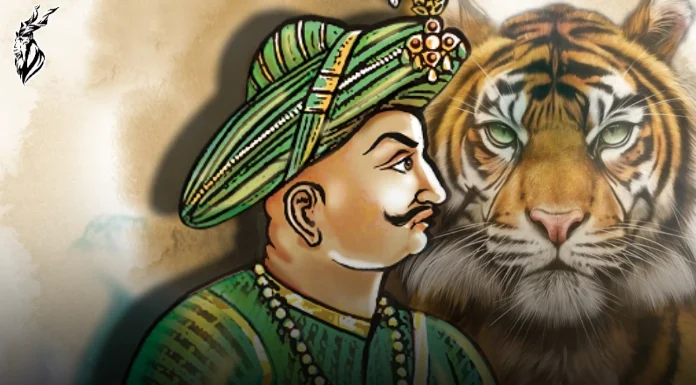May 4th, 1799 was the date when Tipu Sultan, affectionately known as ‘Tiger of Mysore’ embraced martyrdom. He died while fighting against the British East India company. Tipu Sultan’s ministers betrayed him. If this wasn’t the case, the fate of the battle would have changed.
Betrayal through deception has always been a tool of warfare. Tipu Sultan was very capable of taking the adversary with a decisive blow. Only if it was not for the betrayal of ministers and high-ranking officers of Sultan Tipu. Likewise, the complex web of maneuvers undermined the Military prowess. This caused the kingdom of Mysore to slip into adversarial’s hands with perfect ease.
Tipu succeeded to the throne of Mysore after his father, Haider Ali died in 1782. His valour was so exemplary that even Napolean Bonaparte wanted an alliance with him.
Haider Ali, Tipu’s father started his career as a soldier under one of the mighty ministers at Mysore around 1749. He was courageous in stopping the Maratha attacks in Mysore. He fought against British forces and extended Mysore’s land to the south to the rich Calicut coast.
Anglo Mysore Wars
The first war between Mysore and the British occurred in (1767–69). During this time period, Hyder Ali enjoyed some measure of success against the British, almost capturing Madras. The second engagement came in 1780 which ended with the treaty of Mangalore. The third war came in 1790 when Tipu Sultan attacked Travancore. In the fourth and last war, Mysore had an army of 36,000 while EIC had 10,000 troops supported by thousands of Hyderabadi forces.
Siege of Seringapatam
This was the final battle that ended the fourth battle of Mysore. The British, with the allied Nizam of Hyderabad and Maratha, achieved a decisive victory after breaching the walls of the fortress at Seringapatam and storming the citadel. The leader of the British troops was Major General David Baird. Tipu Sultan was martyred in this siege.
Sultan Tipu – A victim of Betrayal
Tipu and his army strongly held the fort against battery attacks by the British and Hyderabad’s forces. However, Mir Sadiq, one of Tipu’s ministers betrayed Tipu Sultan. Sadiq at the crucial moment withdrew troops stationed at a breach in fortification on the pretext of giving them salaries. Once the troops were removed, the traitors signaled the British by waving a white handkerchief which eventually led to the overrun of the fort.
Legacy of Tipu Sultan
William Dalrymple, a famous historian on the subcontinent and South Asia, writes that: “Tipu also tried to import industrial technology through French engineers, and experimented with harnessing water-power to drive his machinery. He sent envoys to southern China to bring back silkworm eggs and established sericulture in Mysore.
Domestic Reforms of Tipu Sultan
Tipu Sultan created a set of revenue regulations that regulated land taxes and even offered subsidies to farmers if they farmed more land.
He set up a department of animal husbandry to breed superior strains of draught cattle and horses, and he built a network of new roads. More remarkably still, he created what amounted to a large State Trading Company with its own ships and factories dotted across the Persian Gulf.
One scholar claimed that he “was so innovative and dynamic that, had not destiny cut short his life, he would have ushered Mysore into an industrial age.
Lover for Knowledge and Crafts
Tipu Sultan’s substantial library contained some 2,000 volumes in several languages. The library had books not only about theology, ethics, Sufism, cosmology, and Islamic jurisprudence but also on history, poetry, the sciences, mathematics, and astronomy.
Perhaps the greatest of all the arts of the court of Tipu is the metalwork and jewellery. Tipu loved beautiful objects, which filled his carefully amassed treasury.
Mysore’s Rockets
There was a regular rocket corp in the Mysore Army, beginning with about 1,200 men in Hyder Ali’s time. Tipu regulated the use of rockets in warfare against the British. Their conflicts with the company exposed the British to this technology. This technology was then used to advance European rocketry with the development of the Congreve rocket in 1805 which was used in Napoleanic wars.
For his heroic exploits, both Muslims and Hindus consider Tipu as a figure of resistance. After his martyrdom, no other contenders were left to challenge the British.
This signifies the strength and mettle of the Sultan. He would have amassed strength with aid from allies, especially France, and would have given a tough time to the British. However it was not only the Sultan who became a victim of such ploys, the British frequently used this tool of buying out traitors to destabilize warring kingdoms. A similar thing happened when the British fought Nawab Siraj ud Daula of Bengal at the Battle of Plassey. One of the Nawab’s commanders Mir Jafar betrayed him for the sake of disposing Sultan and becoming Nawab of Bengal under British patronage.




![Ukrainian and Russian flags with soldier silhouettes representing ongoing conflict. [Image via Atlantic Council].](https://southasiatimes.org/wp-content/uploads/2026/02/2022-02-09T000000Z_1319661209_MT1NURPHO000HXCNME_RTRMADP_3_UKRAINE-CONFLICT-STOCK-PICTURES-scaled-e1661353077377.jpg)


